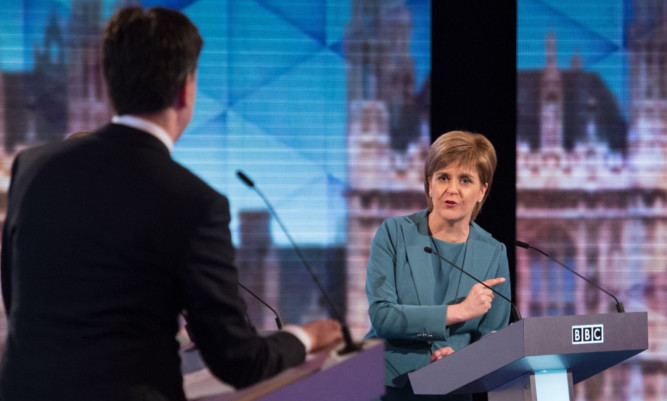The SNP could prop up a minority Labour administration even if Ed Miliband’s party ends up with 40 fewer MPs than the Conservatives after the General Election, SNP leader Nicola Sturgeon has said.
Ms Sturgeon’s comment came as David Cameron launched the Conservative Party’s first English manifesto, containing changes which he said would allow the creation of an “English income tax” at lower rates than north of the border.
Two polls gave Conservatives a four-point lead over Labour – the kind of advantage which could leave Mr Cameron with 20-25 more MPs than Mr Miliband but short of a majority in the House of Commons. One survey, for the Daily Mirror, showed Labour dipping below 30% for the first time in the General Election campaign. But another, in The Sun, had Labour in a two-point lead on 35%, to the Tories’ 33%.
Returning to the election fray after a trip to Brussels for an emergency EU summit on migrant boats in the Mediterranean, Mr Cameron stepped up his efforts to persuade Ukip supporters to switch to Tories with a warning that a Labour government supported by the SNP would allow “a return to uncontrolled immigration”.
Writing in the Daily Mail, the Prime Minister said: “It’s clear: Ed Miliband in Downing Street would increase immigration, not reduce it. And if you’re someone considering voting Ukip because you want a referendum on Europe and controlled immigration, remember that a vote for Ukip makes it harder for Conservatives to win – and much more likely for Ed Miliband and the SNP to get into government. Then you will get no referendum, and a return to uncontrolled immigration.”
A Labour spokesman retorted: “The increasingly desperate Tory campaign resorts to lies once more – this time on immigration.”
Mr Cameron had broken his promise to reduce net migration to the tens of thousands and left office with immigration “far higher” than when he became PM, said the spokesman, adding: “The truth is it is a desperate David Cameron who has failed on immigration and undermined public confidence as a result.”
The Tories’ English manifesto included a timetable to introduce “English votes for English laws” within a year of the May 7 election, and plans to extend the principle to cover financial measures, in a reflection of the devolution of tax-raising powers to Scotland. This would mean any income tax changes in the 2016 Budget applying only to England, Wales and Northern Ireland would require the consent of MPs from these nations.
As expectations remained high of a hung parliament with a contingent of as many as 50 SNP MPs, Ms Sturgeon was asked on BBC2’s Newsnight whether her party would be ready to prop up a Labour government if the party had fewer seats than the Conservatives.
She replied: “Yes. Even if the Tories are the largest party, if there is an anti-Tory majority, my offer to Labour is to work together to keep the Tories out.”
Asked if this would remain her position even if Mr Cameron had 30 more MPs than Mr Miliband, she confirmed: “If there is an anti-Tory majority, yes, that’s what I’ve been saying all along – I’m not sure why there’s any confusion about it – that we would work with Labour to stop the Tories getting into Downing Street.”
Even if the Tories had as many as 40 more MPs than Labour, she said: “If they can’t command a majority they can’t be a government, that’s the basic rule of how governments are formed, I’d have thought.”
A Conservative spokesman described Ms Sturgeon’s comments as “a wake-up call to everyone who wants to see our economic recovery secured”.
“A party which had been beaten in England would be propped up by the party which had beaten them in Scotland – to impose higher taxes and increased borrowing that would wreck our recovery and hurt hard-working people,” said the Tory spokesman.
“You can stop this from happening – but the only way is to vote Conservative, so we can gain the 23 seats we need to get a majority and secure our economy for the next five years.”
In a speech to foreign affairs think-tank Chatham House, Mr Miliband is due to take aim at Mr Cameron’s European policy, with a warning that “small-minded isolationism” from the Tories had led to the biggest loss of British influence abroad in a generation.
In stark contrast to the Conservative promise of an in/out referendum on Britain’s membership of the European Union, Mr Miliband will also say he “will never put our national interest at risk by threatening to leave”.
But a former minister in Gordon Brown’s government, Lord (Digby) Jones, urged the Labour leader to stop “sneering” at wealth-creators, in an open letter to the Daily Telegraph in which he accused Mr Miliband of being “ignorant at worst and disinterested at best” about the impact of higher tax levels on the rich.
Meanwhile, Liberal Democrats were warning that businesses and the City fear a lurch either to the right or left after the election – something which Lib Dem Treasury minister Danny Alexander said would “jam the breaks on the economic recovery”.
Tories were boosted by a Survation poll in the Mirror which put them on 33% to Labour’s 29%, with Ukip up one on 18% and Lib Dems up three on 10%, as well as a ComRes survey for the Mail and ITV News which had Conservatives on 36%, Labour 32%, Ukip 10% and Lib Dems 8%. However, a YouGov survey for The Sun put Mr Miliband’s party in the lead on 35% to the Tories’ 33%, Ukip’s 13% and the Lib Dems’ 8%.
